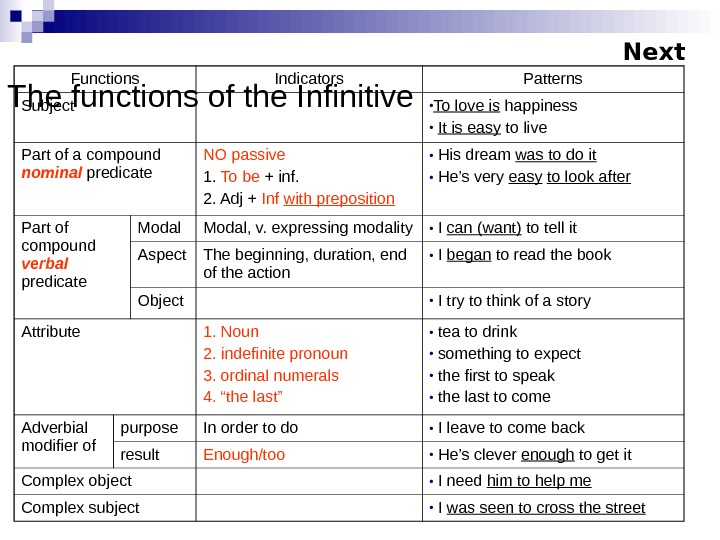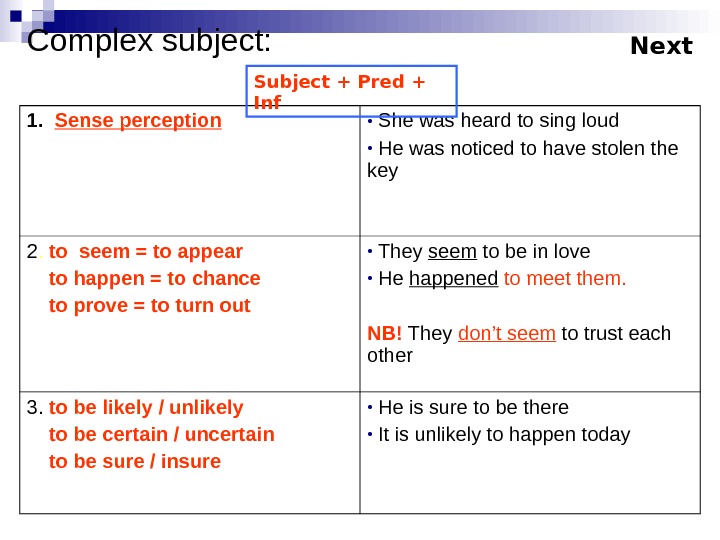The Infinitive Frolova Svetlana group 217 The









- Размер: 126.5 Кб
- Количество слайдов: 8
Описание презентации The Infinitive Frolova Svetlana group 217 The по слайдам
 The Infinitive Frolova Svetlana group
The Infinitive Frolova Svetlana group
 The Infinitive 1. Forms of the Infinitive 2. The functions of the Infinitive 3. Complex object 4. Complex subject 5. Bare Infinitive 6. The for-to-infinitive construction
The Infinitive 1. Forms of the Infinitive 2. The functions of the Infinitive 3. Complex object 4. Complex subject 5. Bare Infinitive 6. The for-to-infinitive construction
 Forms of the Infinitive Active Passive Simple Continuous Perfect Cont. to drive to be driving to have driven to have been driving to be driven — to have been driven — Nex t NB! After: happy, sorry, glad etc. we use Perf. Forms show that the action have already done. Ex. : I’m glad to have helped you – Я рад, что помог вам Simp. Forms – to show that the action is going to take place. Ex. : I’m happy to help you – Я рад буду вам помочь
Forms of the Infinitive Active Passive Simple Continuous Perfect Cont. to drive to be driving to have driven to have been driving to be driven — to have been driven — Nex t NB! After: happy, sorry, glad etc. we use Perf. Forms show that the action have already done. Ex. : I’m glad to have helped you – Я рад, что помог вам Simp. Forms – to show that the action is going to take place. Ex. : I’m happy to help you – Я рад буду вам помочь
 The functions of the Infinitive Functions Indicators Patterns Subject • To love is happiness • It is easy to live Part of a compound nominal predicate NO passive 1. To be + inf. 2. Adj + Inf with preposition • His dream was to do it • He’s very easy to look after Part of compound verbal predicate Modal, v. expressing modality • I can (want) to tell it Aspect The beginning, duration, end of the action • I began to read the book Object • I try to think of a story Attribute 1. Noun 2. indefinite pronoun 3. ordinal numerals 4. “the last” • tea to drink • something to expect • the first to speak • the last to come Adverbial modifier of purpose In order to do • I leave to come back result Enough/too • He’s clever enough to get it Complex object • I need him to help me Complex subject • I was seen to cross the street Next
The functions of the Infinitive Functions Indicators Patterns Subject • To love is happiness • It is easy to live Part of a compound nominal predicate NO passive 1. To be + inf. 2. Adj + Inf with preposition • His dream was to do it • He’s very easy to look after Part of compound verbal predicate Modal, v. expressing modality • I can (want) to tell it Aspect The beginning, duration, end of the action • I began to read the book Object • I try to think of a story Attribute 1. Noun 2. indefinite pronoun 3. ordinal numerals 4. “the last” • tea to drink • something to expect • the first to speak • the last to come Adverbial modifier of purpose In order to do • I leave to come back result Enough/too • He’s clever enough to get it Complex object • I need him to help me Complex subject • I was seen to cross the street Next
 Complex object: Sense perception BN! See ( «понимать» ) , hear ( «узнавать» ) • I hear him laugh • But! I heard that he is going to arrive Mental activity : To know, to consider ( можно опустить to be) to think, to believe, to suppose • I know you the most interesting man • I suppose that girl to be an actress Verbs of declaring To pronounce, to declare, to report • He reported to come tomorrow Wish and intention To want, to wish, to desire, to mean, to intend, to choose ( «хотеть» ) • He choose her to became his wife Feeling and emotion To like, to love, to hate, cannot bear • I hate you to pretend Order and permission To order, to allow, to suffer, to have • I have never allowed her to be alone Verbs of compulsion To make, to have, to cause, to force, to get • Take him do it • I forced you to became a singer Verbs requiring prepositions • I rely on you to make her come. We usually use Complex object after: Next. Subject + Pred + Object + Inf
Complex object: Sense perception BN! See ( «понимать» ) , hear ( «узнавать» ) • I hear him laugh • But! I heard that he is going to arrive Mental activity : To know, to consider ( можно опустить to be) to think, to believe, to suppose • I know you the most interesting man • I suppose that girl to be an actress Verbs of declaring To pronounce, to declare, to report • He reported to come tomorrow Wish and intention To want, to wish, to desire, to mean, to intend, to choose ( «хотеть» ) • He choose her to became his wife Feeling and emotion To like, to love, to hate, cannot bear • I hate you to pretend Order and permission To order, to allow, to suffer, to have • I have never allowed her to be alone Verbs of compulsion To make, to have, to cause, to force, to get • Take him do it • I forced you to became a singer Verbs requiring prepositions • I rely on you to make her come. We usually use Complex object after: Next. Subject + Pred + Object + Inf
 Complex subject: 1. Sense perception • She was heard to sing loud • He was noticed to have stolen the key 2. to seem = to appear to happen = to chance to prove = to turn out • They seem to be in love • He happened to meet them. NB! They don’t seem to trust each other 3. to be likely / unlikely to be certain / uncertain to be sure / insure • He is sure to be there • It is unlikely to happen today. Subject + Pred + Inf Next
Complex subject: 1. Sense perception • She was heard to sing loud • He was noticed to have stolen the key 2. to seem = to appear to happen = to chance to prove = to turn out • They seem to be in love • He happened to meet them. NB! They don’t seem to trust each other 3. to be likely / unlikely to be certain / uncertain to be sure / insure • He is sure to be there • It is unlikely to happen today. Subject + Pred + Inf Next
 Bare Infinitive Next 1. After auxiliary and modal verbs (except ought to, have to) • I don’t understand the reason you run away • I had to go 2. Sense perception : to notice, to hear, to feel, to observe, to see, to watch to make NB: in Passive with TO to let NB: is never used in Passive (to allow) in Passive with TO • He observed them dance • I made her sing But! I was made to do it • Parents let her go out But! She was allowed to go out 3. Constructions: Had better, cannot but, would rather, would sooner, why not • She had better stay at home • Why not take him in the trip. The infinitive without “to”. We use it:
Bare Infinitive Next 1. After auxiliary and modal verbs (except ought to, have to) • I don’t understand the reason you run away • I had to go 2. Sense perception : to notice, to hear, to feel, to observe, to see, to watch to make NB: in Passive with TO to let NB: is never used in Passive (to allow) in Passive with TO • He observed them dance • I made her sing But! I was made to do it • Parents let her go out But! She was allowed to go out 3. Constructions: Had better, cannot but, would rather, would sooner, why not • She had better stay at home • Why not take him in the trip. The infinitive without “to”. We use it:
 The-for-to-infinitive-construction Subject to be easy for smb to do smth Object 1) to wait, to arrange, to be anxious + for smb to do smth 2) To make, to think + it is easy/difficult for smb to do smth Attribute 1) there is somebody , there is nothing + for smb to do b) It’s not the right thing/the only thing + for smb to do The Adverbial Modifier of Purpose to do smth for smb to do smth Result (too) clever(enough), young for smb to do smth • It is difficult for me to understand her reasons. • I’m not waiting for you to come • His words make it difficult for me to forgive you • Is there anyone for her to take acre of • It’s the only thing for me to eat • I bought a toy for him to play. • The water was cold for child to swim Next
The-for-to-infinitive-construction Subject to be easy for smb to do smth Object 1) to wait, to arrange, to be anxious + for smb to do smth 2) To make, to think + it is easy/difficult for smb to do smth Attribute 1) there is somebody , there is nothing + for smb to do b) It’s not the right thing/the only thing + for smb to do The Adverbial Modifier of Purpose to do smth for smb to do smth Result (too) clever(enough), young for smb to do smth • It is difficult for me to understand her reasons. • I’m not waiting for you to come • His words make it difficult for me to forgive you • Is there anyone for her to take acre of • It’s the only thing for me to eat • I bought a toy for him to play. • The water was cold for child to swim Next

